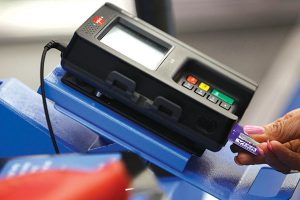Bloomberg
Mastercard Inc. said spending on its network jumped 18% as US consumers battle once-in-a-generation levels of inflation.
Payment volume soared to $1.65 trillion in the second quarter, topping the $1.64 trillion average of analyst estimates in a Bloomberg survey. The company boosted its forecast for revenue growth for the year after it reported a 58% surge in overseas payments as consumers flocked to take trips and get back on road following two years of pandemic-induced lockdowns.
“We had strong revenue and earnings growth again this quarter, as overall consumer spending remained robust and cross-border volumes grew,†Chief Executive Officer Michael Miebach said. “Increasing inflationary pressures have yet to significantly impact overall consumer spending, but we will continue to monitor this closely.â€
Mastercard and Visa Inc. take a slice of the purchase price each time consumers use their cards at checkout, so the payment giants are benefiting from higher prices. Mastercard said it now expects net revenue for the year to increase by a percentage in the “low-end of high teens†range, compared to an earlier forecast of growth in the “high-end of mid-teens.â€
Mastercard has been spending more to develop alternative-payments systems and on its data and other analytics businesses. Expenses at the Purchase, New York-based company rose to $2.5 billion, topping the $2.31 billion average of analysts’ estimates. Costs for year are now expected to rise by a percentage in the “low-end of low double digits,†compared to an earlier forecast of a percentage in high single digits.
Net income climbed 10% to $2.3 billion, or $2.34 a share. Excluding certain one-time items and litigation expenses, profit rose to $2.56 a share. That compares with the $2.37 average of analyst estimates compiled by Bloomberg.
Mastercard and Visa are facing fresh controversy in Washington, where two US senators said they plan to introduce legislation that would give merchants the ability to route credit-card transactions over alternative networks.
The bill would take aim at a key source of revenue for the companies, which set the fees merchants are charged each time a consumer swipes one of their cards at checkout.
Banks collect the bulk of these so-called swipe fees before handing over a slice to the payments giants.
 The Gulf Time Newspaper One of the finest business newspapers in the UAE brought to you by our professional writers and editors.
The Gulf Time Newspaper One of the finest business newspapers in the UAE brought to you by our professional writers and editors.
